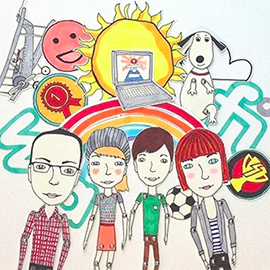Fishwah! Say that again! Fish rhymes with dish and wah rhymes with ahh, and in Hindi language stands for exclamatory praise. Fish-wah!
Founders of that startup – Stephen and Natalie Byrne – believe the ‘fish’ in Fishwah represents “freedom and a calming influence” for those who are anxious; and the ‘wah’ in the curiosity-eliciting word “adds a sense of fun.”
Fishwah is bringing online therapy to parents and children traumatised by anxiety. Based on so-called “exposure therapy,” the Byrnes are targeting primary school aged children, offering therapeutic techniques to manage and reduce anxiety. For more on exposure therapy, read this article from BetterHelp.
Necessity the mother of invention
The Byrnes’ entrepreneurial venture follows first-hand experience with their son, who was stricken by unnatural anxiety, and a way they developed to help the boy.
“Four years ago we learned that our son was suffering from anxiety issues, and we found there were no easy-to-access, hands-on, achievable programs for families to combat it,” said Stephen Byrne, who was into CAD for two decades prior to starting Fishwah.
Fishwah cites several stats to make the point that anxiety among children, and parents, is a bigger problem than popular perception. Over a 12-month period, one in seven Australians suffer anxiety, and diagnosable anxiety disorders are found in around one in ten children. Anxiety takes many forms, even a variety of phobias.
Tech does well even for therapy
“While traditional therapy can help, it is often difficult for families to juggle sessions with their busy daily schedules. While developing our own family’s response, Natalie and I began to design a digital tool to track and reward our child’s progress. We found that we’d built the groundwork for something that could help any parent in the same position as we were in – and the idea for Fishwah was born.”
The Byrnes call Fishwah a “behavioural change tool,” that can help kids build confidence to achieve real goals – from academic to special needs, to overcoming worries, fears and anxiety issues. The online platform is structured to break issues into manageable steps, with a reward-based progress system for the children and tips to mums and dads.
“A lack of confidence is a significant issue for kids and can end up holding them back – which I don’t think any parent wants for their child,” said Natalie Byrne, who was previously a high school teacher. “Essentially we’ve taken the principles of the successfully proven exposure therapy, which is all about breaking down fears into graded steps, but we are making it digital,” she added.
Fishwah’s online program cost $9.95 per month, with cheaper half-yearly and annual packages.






![The Top 5 Most Insanely Dumb Mistakes made by Rookie and Seasoned LinkedIn Users, with David Hobson [FREE REPORT]](https://anthillonline.com/wp-content/uploads/2015/07/Screen-Shot-2015-11-26-at-14.29.18-300x194.png)
![THE ULTIMATE CASHFLOW CHECKLIST [FREE DOWNLOAD]](https://anthillonline.com/wp-content/uploads/2016/06/james-Seven-simple-strategies-to-cut-costs-04.pdf-Box-2016-06-30-13-49-35-100x75.png)

![Five essential things to get right if you want to raise capital, with Bryan Vadas [FREE CHEAT SHEET]](https://anthillonline.com/wp-content/uploads/2015/08/vadas-3d-cover-01--100x75.png)
![Learn how to generate more leads in one month than most competitors would in one year! [FREE REPORT]](https://anthillonline.com/wp-content/uploads/2015/08/Capture4-100x75.jpg)
![How to confidently raise venture capital… with Jack Delosa [CHEAT SHEET]](https://anthillonline.com/wp-content/uploads/2016/04/jack-de-losa-confidently-raising-venture-NFSU-rebrand-01.pdf-Box-2016-04-19-12-37-42-100x75.png)

![Do you do daily affirmations like this kid? [VIDEO]](https://anthillonline.com/wp-content/uploads/2015/02/Toddler-300x350.jpg)
![Is this what a gamified future will really be like? [VIDEO]](https://anthillonline.com/wp-content/uploads/2012/08/HypnoToad2-300x332.gif)
![Is this ethical advertising? Is it for the greater good? [VIDEO]](https://anthillonline.com/wp-content/uploads/2013/06/HomePro-300x350.jpg)
![THE ULTIMATE CASHFLOW CHECKLIST [FREE DOWNLOAD]](https://anthillonline.com/wp-content/uploads/2016/06/james-Seven-simple-strategies-to-cut-costs-04.pdf-Box-2016-06-30-13-49-35-300x194.png)
![How to expand into New Markets with Elsita Meyer-Brandt [CHEAT SHEET]](https://anthillonline.com/wp-content/uploads/2015/07/Screen-Shot-2015-11-26-at-15.52.30-100x75.png)
![How to secure lucrative sponsorships in five steps [CHEAT SHEET]](https://anthillonline.com/wp-content/uploads/2016/02/jackie-fast-meme-04-100x75.jpg)
![How Master the Art of Sales Even if it Makes You Feel All Weird and Icky Inside with Phil Anderson [CHEAT SHEET]](https://anthillonline.com/wp-content/uploads/2015/08/PHIL-ANDERSON-COVER-100x75.png)
![Five ways to manage your time by managing yourself, with Helen Ebdon [CHEAT SHEET]](https://anthillonline.com/wp-content/uploads/2015/07/ebdon-3d-cover-01--100x75.png)
![New Zealand’s Xero eyes US IPO, further disruption as subscribers increase [INFOGRAPHIC]](https://anthillonline.com/wp-content/uploads/2014/07/sruuuuujana-212x194.png)
![Ever wonder if your ‘content marketing’ is really just crap? You gotta see this! [INFOGRAPHIC]](https://anthillonline.com/wp-content/uploads/2014/08/content-100x75.jpg)
![7 Business Lessons From Game of Thrones [INFOGRAPHIC]](https://anthillonline.com/wp-content/uploads/2014/10/infographic-games-of-thrones-041-100x75.jpg)
![How to build your own Media Empire… In seven steps with Nathan Chan [INFOGRAPHIC]](https://anthillonline.com/wp-content/uploads/2014/10/Nathan-Chan-Infographic-e1413419529176-100x75.jpg)
![5 Business Lessons From Tinder [INFOGRAPHIC]](https://anthillonline.com/wp-content/uploads/2014/10/Tinder-Elegant-Infographic-100x75.jpg)



